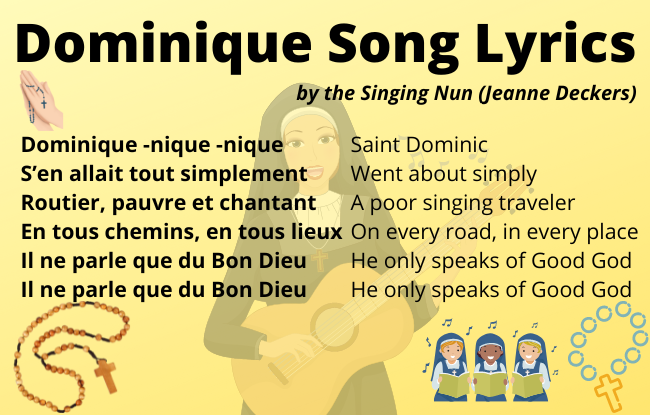“Dominique“ (pronounced dɔminik) is one of the most famous French songs of all time. The song was written and released in 1963 by Belgian nun and singer Jeanne-Paule Marie Deckers (1933-1985), also known as Sœur Sourire (pronounced sœʀ suʀiʀ) or The Singing Nun.

The song lyrics of Dominique have been translated into English as well as many other languages including Spanish, Italian, German, Dutch, Hebrew and Japanese. The song went straight to the top of the charts all over the world.
Deckers was a member of the Dominican Order, an order of the Catholic church. The song Dominique commemorates Saint Dominic, the Spanish priest who founded the Dominican Order. Deckers died by suicide in 1985 at the age of fifty-one along side her best friend, Annie Pécher.

Image credit: Priscila Sherlyn, CC BY-SA 4.0, via Wikimedia Commons
Listen to Dominique
Dominique French Lyrics & English Translation
Dominique -nique -nique
S’en allait tout simplement
Routier, pauvre et chantant
En tous chemins, en tous lieux
Il ne parle que du Bon Dieu
Il ne parle que du Bon Dieu
Saint Dominic
Went about simply
A poor singing traveler
On every road, in every place
He only speaks of Good God
He only speaks of Good God
À l’époque où Jean Sans Terre
D’Angleterre était le roi
Dominique notre père, combattit les albigeois
At the time when Johnny Lackland
From England was king
Our father Dominique was fighting the Albigensians
Dominique -nique -nique
S’en allait tout simplement
Routier, pauvre et chantant
En tous chemins, en tous lieux
Il ne parle que du Bon Dieu
Il ne parle que du Bon Dieu
Saint Dominic
Went about simply
A poor singing traveler
On every road, in every place
He only speaks of Good God
He only speaks of Good God
Certains jours un hérétique
Par des ronces le conduit
Mais notre Père Dominique, par sa joie le convertit
Certain days a heretic
Drove him in the brambles
But our Father Dominic, through joy converted him
Dominique -nique -nique
S’en allait tout simplement
Routier, pauvre et chantant
En tous chemins, en tous lieux
Il ne parle que du Bon Dieu
Il ne parle que du Bon Dieu
Saint Dominic
Went about simply
A poor singing traveler
On every road, in every place
He only speaks of Good God
He only speaks of Good God
Ni chameau, ni diligence
Il parcourt l’Europe à pied
Scandinavie ou Provence, dans la sainte pauvreté
Not by camel, not by stagecoach
He traveled through Europe on foot
Scandinavia or Provence, in saintly poverty
Dominique -nique -nique
S’en allait tout simplement
Routier, pauvre et chantant
En tous chemins, en tous lieux
Il ne parle que du Bon Dieu
Il ne parle que du Bon Dieu
Saint Dominic
Went about simply
A poor singing traveler
On every road, in every place
He only speaks of Good God
He only speaks of Good God
Enflamma de toute école
Filles et garçons pleins d’ardeur
Et pour semer la parole, inventa les Frères-Prêcheurs
Impassioning the entire school
Boys and girls full of fervor
To spread the word, the Dominican Order came about
Dominique -nique -nique
S’en allait tout simplement
Routier, pauvre et chantant
En tous chemins, en tous lieux
Il ne parle que du Bon Dieu
Il ne parle que du Bon Dieu
Saint Dominic
Went about simply
A poor singing traveler
On every road, in every place
He only speaks of Good God
He only speaks of Good God
Chez Dominique et ses frères
Le pain s’en vint à manquer
Et deux anges se présentèrent, portant de grands pains dorés
At the home of Dominique and his brothers
Break was starting to lack
And two angels showed up, bringing golden loaves
Dominique -nique -nique
S’en allait tout simplement
Routier, pauvre et chantant
En tous chemins, en tous lieux
Il ne parle que du Bon Dieu
Il ne parle que du Bon Dieu
Saint Dominic
Went about simply
A poor singing traveler
On every road, in every place
He only speaks of Good God
He only speaks of Good God
Dominique vit en rêve
Les prêcheurs du monde entier
Sous le manteau de la Vierge, en grand nombre rassemblés
Saint Dominic lives in a dream
Preachers from all over the world
Under the mantel of the Virgin, gather together in great numbers
Dominique -nique -nique
S’en allait tout simplement
Routier, pauvre et chantant
En tous chemins, en tous lieux
Il ne parle que du Bon Dieu
Il ne parle que du Bon Dieu
Saint Dominic
Went about simply
A poor singing traveler
On every road, in every place
He only speaks of Good God
He only speaks of Good God
Dominique, mon bon Père
Garde-nous simples et gais
Pour annoncer à nos frères, la vie et la vérité
Dominique, my good Father
Keep us simple and happy
to announce to our brothers, life and truth
Dominique -nique -nique
S’en allait tout simplement
Routier, pauvre et chantant
En tous chemins, en tous lieux
Il ne parle que du Bon Dieu
Il ne parle que du Bon Dieu
Saint Dominic
Went about simply
A poor singing traveler
On every road, in every place
He only speaks of Good God
He only speaks of Good God

Dominique lyrics analysis
In the following section we have hand-selected lines which we believe help students to further their learning about French vocabulary and grammar.
Dominique -nique -nique
In the first line of the chorus, Dominique refers to Saint Dominic, the founder of the Dominican Order.
S’en allait tout simplement
This line translates to “Went about simply”. S’en aller can translate to “to go”, “to leave” or “to be off” and is a reflexive from of aller, which means to to.
Routier, pauvre et chantant
This line translates to “A poor singing traveler”. In French, un routier translates to truck driver. In the context of the song Dominique, Saint Dominic is referred to as a routier or traveler. Chantant (singing) is the present participle of chanter (to sing).
En tous chemins, en tous lieux
This line translates to “On every road, in every place”. The word chemin means way, path or road. Lieu means place. Another word for place is endroit.
Il ne parle que du Bon Dieu
This line translates to “He only speaks of Good God”. Other translation of the song offer the translation, “He only speaks of the Lord”. Parler de means to speak or talk about in French. The negation ne…que means “only”.
À l’époque où Jean Sans Terre, D’Angleterre était le roi
These two lines translate to “At the time when Johnny Lackland, From England was king”. The expression à l’époque translates to “at the time”. The masculine noun le roi means king in French.
Dominique notre père, combattit les albigeois
This line translates to “Our father Dominique was fighting the Albigensians”. Combattit is the passé simple (a literary past tense) form of the verb combattre, which means to fight. Notre is a possessive adjective meaning “our”.
Les albigeois refers the Albigensians, a group of religious heretics from the 12th and 13th century.
Certains jours un hérétique, Par des ronces le conduit, Mais notre Père Dominique, par sa joie le convertit
These three lines translate to “Certain days a heretic, Drove him in the brambles, But our Father Dominic, through joy converted him”.
The word ronce translates to brambles or prickly blackberry bushes. This, we believe symbolizes being astray from the Catholic doctrines of the time period. Convertit is the passé simple (literary past) of the verb convertir (to convert). La joie in French translates to “joy”.
Ni chameau, ni diligence, Il parcourt l’Europe à pied, Scandinavie ou Provence, dans la sainte pauvreté
These lines translate to “Not by camel, not by stagecoach, Not by camel, not by stagecoach, He traveled through Europe on foot, Scandinavia or Provence, in saintly poverty”.
Interestingly, une diligence translates to stagecoach. According to Merriam-Webster, a diligence is a synonym for stage coach. Parcourt comes from the verb parcourir, which means to travel, cross, wander, roam and to go all over. Provence, or la Provence refers to a region in the south-east of France.
Enflamma de toute école, Filles et garçons pleins d’ardeur, Et pour semer la parole, inventa les Frères-Prêcheurs
We translated these lines to the following: “Impassioning the entire school, Boys and girls full of fervor, To spread the word, the Dominican Order came about”.
Enflamma is the passé simplé of enflammer, which has translations including “to light” or “to impassion”. The feminine noun fille translates to both girl and daughter.
The verb semer means to sow, as in sow seeds. However, we believe that in a figurative sense it means to spread, as in spread the gospel. The Frères-Prêcheurs refers to the Dominican Order, which Saint Dominic (or Dominique) founded.
Chez Dominique et ses frères, Le pain s’en vint à manquer, Et deux anges se présentèrent, portant de grands pains dorés
These three lines translate to “At the home of Dominique and his brothers, Bread was starting to lack, And two angels showed up, bringing golden loaves”.
The preposition chez in means “at the home of”. S’en vint is the passé simple of s’en venir, which translates literally to “to be coming” or “to be on the way”. Hence, our loose translation was “starting to”. The verb manquer has many usages and translation including both “to miss” and “to lack”. Portant is the present participle of porter (to carry).
Dominique vit en rêve, Les prêcheurs du monde entier, Sous le manteau de la Vierge, en grand nombre rassemblés
These lines translate to “Saint Dominic lives in a dream, Preachers from all over the world, Under the mantel of the Virgin, gather together in great numbers”.
We believe that by saying “Dominique vit en rêve” (Saint Dominic lives in a dream), Deckers was emphasizing that Saint Dominic remains the spiritual father or teacher of the Dominican movement. The verb vivre means “to live”, “to live through” or “to experience”.
Dominique, mon bon Père, Garde-nous simples et gais, Pour annoncer à nos frères, la vie et la vérité
This last verse translates to “”Dominique, my good Father, Keep us simple and happy, to announce to our brothers, life and truth”.
In these lines, le père means father and la vie means “life”. We believe that main message of this song is both to give praise to Saint Dominic and to highlight his spiritual message of light and truth.


